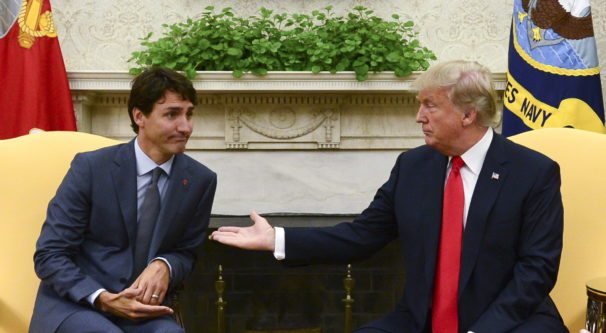
This article won Third Place Award, Best Editorial or Column in the 2018 International Labor Communications Association’s Labor Media Awards.
That was the message Nora Loreto of the Canadian Association of Labour Media (CALM) brought to labor journalists and union communications staff gathered on the eve of the AFL-CIO convention in St. Louis this weekend. Right to work laws, which allow employees in an organized workplace to opt out of paying dues, are aimed at crippling unions. They got their start in the South decades ago and remain the primary weapon in the war on labor.
Among American unions lately, the decision of the Canadian government to make elimination of right to work in the U.S. a condition for its agreement to any “new NAFTA” has been widely lauded. Moderating the same panel on which Loreto spoke, AFL-CIO president Richard Trumka, for instance, said of the treaty negotiations, “Fortunately for us, the Canadian government laid down a labor chapter that was significantly stronger and more progressive” than what Trump was proposing.
While credit is due to the Canadian labor movement for pushing the Trudeau government into putting right to work on the agenda, unionists south of the border should have no illusions about the heartthrob prime minister in Ottawa.
Signaling left
Some U.S. progressives have the perception that the Canadian government is a left-wing, pro-labor bulwark. American liberals swoon when Trudeau appoints a cabinet that is half women, makes an indigenous person the justice minister, marches in pride parades, welcomes Syrian refugees at the airport, or puts a bearded turban-wearing Sikh in charge of the country’s armed forces.
While no one should sully the importance (symbolic and actual) of these milestones, those are the easy things—at least in multicultural Canada. But then come the hard parts. When you get to his labor record, for example, the reality is that Trudeau is in the midst of a scandal that has seen some public workers go months without being paid, even while the executives of the payroll company were raking in bonuses. On First Nations reserves across the country, grinding poverty, lack of clean water, sub-standard housing, and no jobs are still regular parts of life.
Trudeau was ushered into office in 2015 on a progressive platform promising major stimulus spending, infrastructure investment, electoral reform, and increased taxes on the rich. As the old saying goes, though, his Liberal government is one that often signals left while turning right.
On right to work, we may be witnessing something similar. When Trudeau and his foreign minister, Chrystia Freeland, say that stopping U.S. states from instituting anti-union laws is a must for any NAFTA update, the ears of American trade unionists perk up.
And at home, anything that reminds Canadians they are in some way more “advanced” than the behemoth on their southern border usually gets a positive collective nod. The anti-right to work message particularly scores points in towns that have suffered most from de-industrialization since NAFTA came into effect, like the Ontario cities of London, which saw its Kellogg’s cereal plant close down recently after 107 years, and Oshawa, whose citizens are on edge every time General Motors ruminates on changes to its product line.
There are plenty of places in Canada like these that cheer when Trudeau critiques the old NAFTA, but make no mistake, America’s neighbor to the north can’t be placed solidly in the anti-NAFTA column.
NAFTA is more popular than ever
If anything, the original free trade agreement from 1994 is more popular than ever in Canada. Spurred on by Donald Trump’s threats to cancel the pact and the mainstream press’s fear-mongering campaign that an end to NAFTA would crash the Canadian economy, a recent Pew survey shows that public approval of the agreement hits 74 percent. By comparison, in Mexico, 60 percent say it’s been good for them, while U.S. support clocks in at 51 percent.

When you break it down by party lines in Canada, even among the labor-based New Democratic Party (NDP) on the left, seven out of ten members give NAFTA a thumbs-up. For voters backing Trudeau’s center-left Liberals, support soars to 82 percent. Among Conservatives, a point higher, at 83.
Liberals initially promised to oppose NAFTA and renegotiate the then-existing U.S.-Canada Free Trade Agreement way back in the election of 1993. Of course, upon winning, they promptly signed on anyway. This action, along with a post-election pledge to cut $5 of public expenditure for every $1 of new revenue, ended up inaugurating what would become nearly 25 years of austerity.
Stephen Harper, the right-wing Conservative Party leader who ruled from 2006 to 2015, is the big villain to Canadian progressives, but it was Trudeau’s predecessors in the Liberal Party (the center-left segment of Canadian big business politics) that really rushed Canada’s tumble down the neoliberal path.
But for many in Canada, that’s all ancient history now. There is a general perception among the public that, although there were some downsides for manufacturing, the NAFTA trade regime has been generally good for the Canadian economy.
The circle of people reading reports like those produced by the Canadian Centre for Policy Alternatives is too small. Otherwise, more Canadians would know that there has never been a single successful labor complaint under NAFTA’s side agreement on labor rights, that Canada has paid out more than $200 million to settle cases in the secret ISDS trade courts, and that NAFTA’s restrictions on phasing out fossil fuel production and consumption have slowed progress on their country’s commitment to a more sustainable economy.
Zero chance
When it comes down to it, the truth is that there’s essentially zero chance that Canada will balk at signing on to a new NAFTA if its government is faced with the choice of either no agreement or one that would allow the GOP to preserve and expand right to work.
The Republican Party and its big money backers have been committed to destroying unions for so long. Anyone who thinks they will sacrifice this central part of their long-term program on behalf of the shiny new Canadian prime minister will be sorely disappointed.
Don’t count on Justin Trudeau to fall on his sword over right to work. Talking about tougher labor standards performs well at home, and maybe even better abroad. But when it comes to stopping new right to work initiatives or beating back existing ones, it’s still going to take an on-the-ground, community-based fight to do the job—in the United States.










